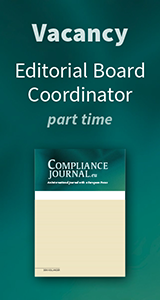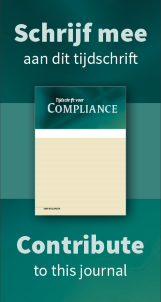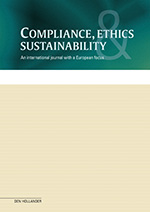How to Implement the UNGP’s on Business and Human Rights in policies and practices?
Siham Lotfi*
Introduction Traditionally, human rights are perceived as a state’s issue - individuals should be protected against the government. However, in 2011 the United Nations' Human Rights Council – after earlier two UN initiatives to set international standards on business and human rights had failed – unanimously endorsed a new standard proclaiming that businesses have the responsibility to respect human rights. This standard is called the United Nations Guiding Principles on Business and Human Rights (hereafter ‘UNGP’s’),
Artikel kopen € 79,00 excl. BTW
In plaats van abonneren kunt u dit artikel ook afzonderlijk kopen.
developed by Harvard professor John Ruggie and his team. They spell out that, while states maintain a duty to protect populations against corporate human rights abuses, businesses have a concurrent responsibility to avoid human rights abuses resulting from their own activities or from their value chain, both at home and abroad. The UNGP’s, being now the authoritative global standard on business and human rights, set out in 31 principles expectations on how states and companies should prevent and address negative impacts on human rights by businesses. With the intention of bringing these principles more to life and providing companies with more practical guidance, a guide has been developed as a joint product by the partners in the Global Perspectives Project, which is an innovative collaboration between the Global Compact Network Netherlands, Oxfam and Shift, funded by the Dutch Ministry of Foreign Affairs. The publication ‘Doing Business with Respect for Human Rights’ (hereafter ‘the Guide’) is built on real experiences of companies, and their stakeholders, in diverse and complex situations.1 The Guide is therefore a practical starting point, as it explains what ‘doing business with respect for human rights’ means, what a company should do and avoid, and prevents companies from having to reinvent the wheel. AkzoNobel has contributed to both this guide, as well as the previous guidance ‘How to do Business with Respect for Human Rights’ which was a result of a 2008-10 project by the Global Compact Network Netherlands, together with several other Dutch multinational companies.2 This article aims to provide a summary of the Guide, while sharing real-life examples from AkzoNobel practice which is now on its journey to implement the UNGP’s. As outlined in the Guide, there are eight practical steps to take in order to implement respect for human rights successfully within an organization. All these steps reflect a few guidance points, which highlight what to pay extra attention to when undertaking the practical steps. This article will address all of those steps, and their guidance points (which will be displayed in bold).
U heeft op dit moment geen toegang tot de volledige inhoud van dit product. U kunt alleen de inleiding en hoofdstukindeling lezen.
Wanneer u volledige toegang wenst tot alle informatie kunt u zich abonneren of inloggen als abonnee.




